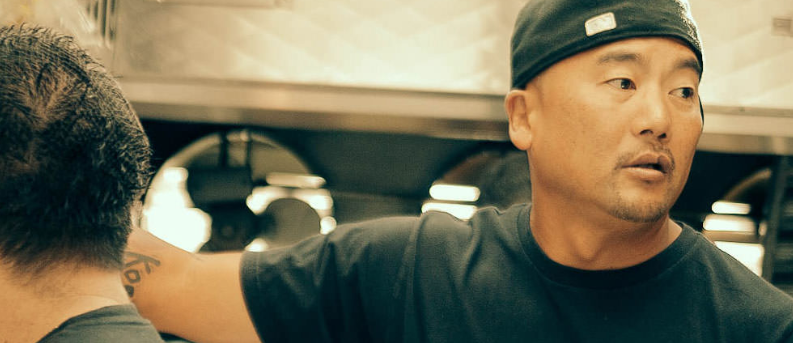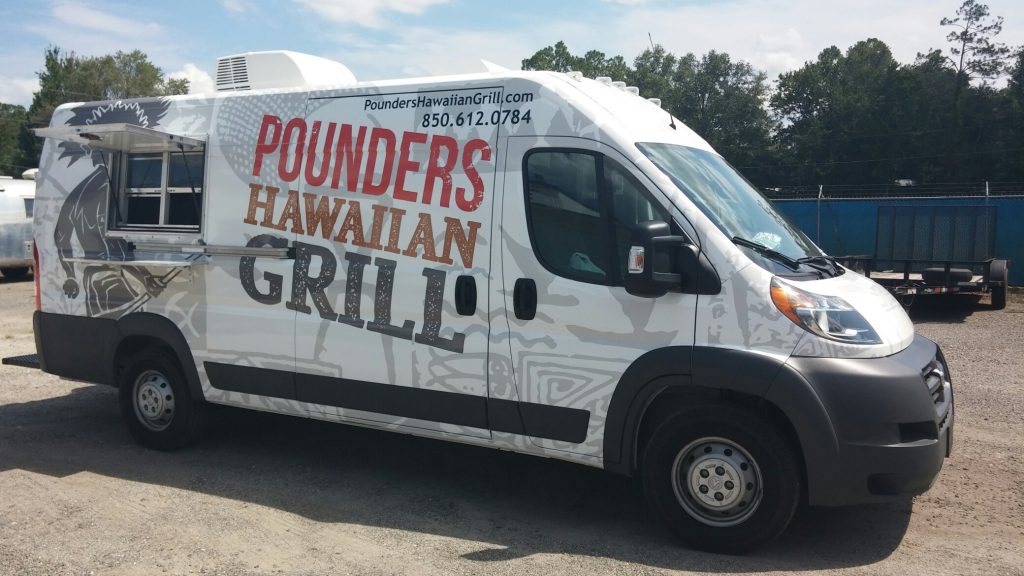Roy Choi proves there’s no limit to the type of food business you can launch with a food truck. Choi’s story is been well told. Starting in Los Angeles with a small food truck serving Korean tacos, he is credited with helping to launch the modern food truck movement as we know it.
Now, only a decade after getting started, Choi has evolved into a celebrity chef with books, a fleet of food trucks, and now a collection of BBQ sauces available only at William’s Sonoma. Choi’s growth is astounding and impossible to replicate, but there’s plenty of business lessons “ordinary” food truck owners can learn from the story too.
While you may never be credited with launching a food movement (timing, location, hard work and luck have a lot to do with that), you can apply some of these lessons into your own food trailer. First is that the concession trailer can serve as the launchpad for a bigger food brand. But often you need to think outside the food truck box to make it happen.

Roy Choi in action. Photo Credit: http://kogibbq.com/about-chef-roy/
Case and point, you don’t need don’t need distribution or support of a major retailer to begin selling your own sauces or rubs. If you own a small BBQ trailer, you can begin by selling homemade rubs at catering events or daily service.
Assuming you operate a BBQ business already, the cool thing about releasing a sauce or rub is that doing so won’t take a lot of extra work. You already have the recipe. You’re already making the product. You already have a business entity and brand created. All you need to do now is package the product according to health guidelines.
Even if you don’t have an existing concession business, thanks to updated Cottage Food Laws in most states you can get started easily from a legal perspective assuming you meet their requirements. Cottage food law vary from state to state, but all of them have limit the amount of revenue you can make per year. In California, you can make over $50,000 annually and still be considered a cottage food business.
In the event you do exceed your small food businesses annual revenue limits, you can change into another food business entity like an LLC or Sole Proprietorship. Needing to change the structure of your business due to a high-volume of sales is a good problem to have.

Built by M&R Specialty Trailers and Trucks
How Could This Work in Your Business?
The examples we’ve shared above all apply to BBQ businesses, but if you use your imagination you could apply similar growth strategies to any food business. Here are a few other ways we’ve seen mobile food owners expand and grow their brands no matter what the product:
- A kettle corn or popcorn vendor could sell organic and packaged bags at independent grocery stores. This could create a new channel of sales. In fact, the brand Boomchickapop started in this exact way by selling at local events and outside Minnesota Vikings football games. In 2017, the same brand was sold to the food giant Conagra. Not bad for a little kettle corn stand.
- A food truck selling Asian-style street tacos eventually started a multi-location restaurant in Austin. The Peached Tortilla is now one of the most popular establishments in the city and even has a location open at the Austin airport if you happen to visit.
- Family members selling lobster rolls from a food truck got an investment ABC’s hit television show Shark Tank. Now Cousins Maine Lobster has evolved into a food truck franchise, restaurant, and successful mail order business. The founders even wrote a book about how they transformed a single food truck into a multi-million dollar food business. Pretty cool!
Of course even if you don’t have aspirations of selling your business to a large corporation or becoming a celebrity chef there are still plenty of lessons that can come from these food business entrepreneurs. Maybe most importantly is that if you’re able to make a concept work on a small scale, it’s likely that you can scale it up and grow your business further through other channels.
Of course, the most natural progression of course would be simply to add a second concession trailer or truck to your business if you already own a mobile food unit. Once you start to get busy and become well known in your area you’ll start to feel like you want to be two places at once. For example, you might want to serve a high-value catering event and a well-attended promotional event on the other side of town. The only way this will be possible is if you have two units.
Bottom line, the great thing about starting out with a food truck is that it can evolve into anything you want: restaurant, more food trucks, a product line, a book, or a celebrity chef. Roy Choi has proven the sky’s the limit when you start a mobile food business.
